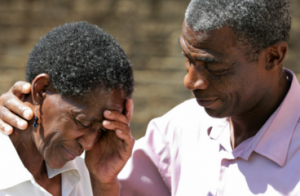(Akiit.com) Grief is something that practically everyone experiences at some point in their lives. For many, it happens because of the passing of a loved one. Grief is the feeling you get when your mind is trying to process that you can’t get back something you’ve lost.
However, by this definition, grief can also occur for other reasons. For instance, many people go through a profound sense of grief when dealing with the loss of their health or a relationship. It can even follow losing a job or moving to a new area. Grief happens when something feels unrecoverable.
For instance, very few people experience a sense of grief when they say goodbye to their friends at the end of a social occasion. That’s because most know that a gathering will happen again. By contrast, most people feel some sense of loss when somebody they care about dies because they can’t get that relationship back. It’s gone forever.
Feeling Bereaved
Psychologists have several explanations for why we experience grief in the way that we do. One idea is that the emotion is a way of preparing us for our inevitable mortality. Eventually, our lives will come to an end, and we need to recognize that fact by mourning others’ loss symbolically. 
This theory sounds a little self-centric and cynical. But it is what some researchers believe underpins the sense of loss we feel.
For others, bereavement is a kind of trauma where reality suddenly forces us to accept the things that we don’t want to be true about life. We have a sense of distress or wanting to be as far away from the issue as we can get. The cultural norms that we experience in our lives don’t prepare us for the sensations we have when somebody eventually dies. For all our health and safety and insurance, nothing can escape the horrors at the bottom of mortality.
Healthy Grief
Psychologists also like to make a distinction between healthy and unhealthy grief. Healthy grief can still feel dreadful while you are going through it. According to researchers in the field, many people going through bereavement can struggle to do even basic things, like wash up the dishes or take a stroll in the park. Grief can manifest itself as a kind of heavy weight on the body, preventing you from engaging in productive activities.
Unhealthy grief is something that prevents you from living your life in the long-run. People who don’t escape the distress of losing somebody they care about can find themselves stuck in their other relationships or their career. Their feelings of loss consume them, and they worry that they will never be able to return to what life was like before.
It’s More Than Feeling Sad
It’s popular to say that certain emotions “are more than just feeling sad.” Today, you can’t say that depression is a form of “sadness.”
The same is true of grief. People going through the process often feel a range of emotions, including shock, anger, and anxiety.
Remember, facing up to mortality creates all kinds of distressing feelings that people don’t have to confront in their everyday lives. Dealing with the idea that somebody could just vanish from existence like that gets you asking deep questions. The grieving person can often experience nightmares, shock, and disbelief. During these difficult times, seeking professional support, such as grief counseling san antonio (or similar services in your area), can provide guidance and coping strategies to help process emotions in a healthy way. Counsellors can offer a safe space to express feelings, work through unresolved emotions, and develop tools to manage grief over time, making it easier to find a sense of peace and healing.
Dealing With Loss
The way that people deal with their sense of loss varies from person to person. For some, it is holding onto the memory of a loved one with a cremation urn on their mantelpiece. For others, it is attending a funeral.
The way we all come to accept the realities of life varies from person to person. Usually, people experience grief pangs, which are feelings of intense yearning for whatever was lost to come back. These serve the purpose of helping come to an acceptance of what’s happened and move on. It’s challenging while you’re experiencing it, but it is also necessary in some ways,
Some people can also get the sense that they’ve lost a part of themselves, especially when a spouse dies. They feel as if the aspect of their identity wrapped up in that person is also lost forever, and they can’t get it back. They can’t imagine returning to the world that existed before they met them.
The good news is that recovering from bereavement is possible. We all experience loss in different ways. But that doesn’t mean that it has to dominate our lives. There are ways to get through it.
Staff Writer; Sherry Short









Leave a Reply